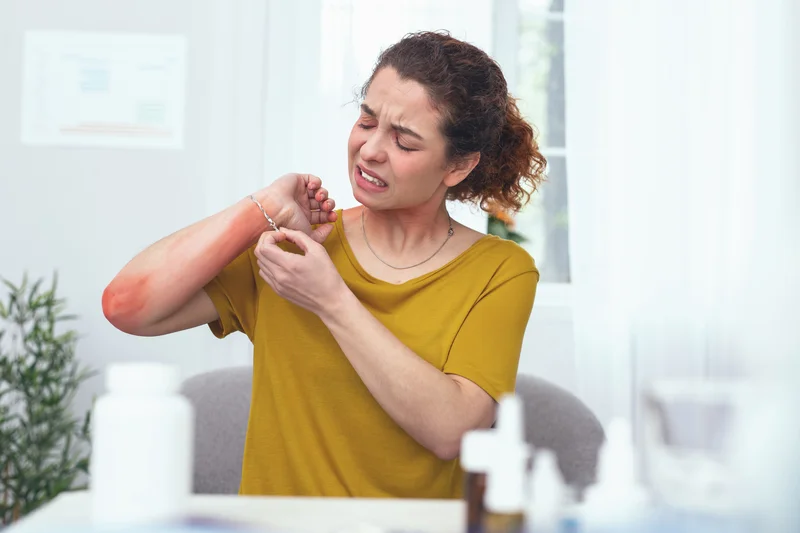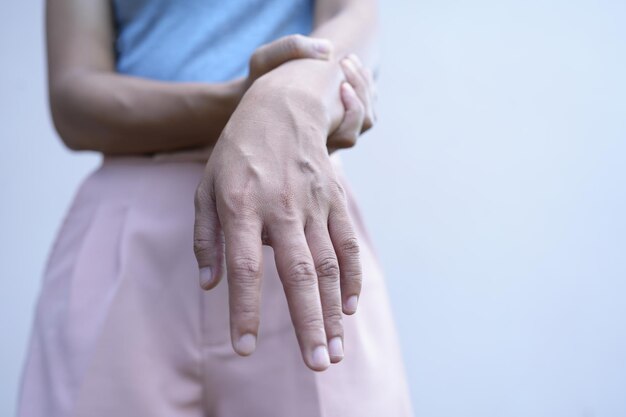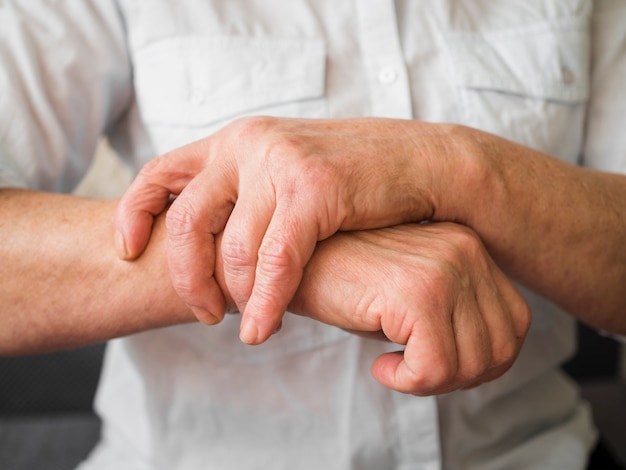Ask Ayurvedic doctor a question and get a consultation online on the problem of your concern in a free or paid mode. More than 2,000 experienced doctors work and wait for your questions on our site and help users to solve their health problems every day.
Psoriatic Arthritis – Natural Ayurvedic Approaches for Joint and Skin Wellness

Introduction to Psoriatic Arthritis
Psoriatic arthritis is a chronic inflammatory condition that affects both the joints and the skin, often occurring in individuals with psoriasis. Characterized by joint pain, stiffness, and swelling, it can significantly impact the quality of life. From an Ayurvedic perspective, psoriatic arthritis is viewed as a manifestation of imbalances in the body's doshas and the accumulation of toxins (ama). Ayurvedic medicine offers a holistic approach to managing psoriatic arthritis through herbal treatments, dietary modifications, and lifestyle changes aimed at restoring balance and promoting overall well-being.
Don't wait or self medicate. Start chat with Doctor NOW
Historical Roots & Ayurvedic Significance
Ayurveda, the ancient system of medicine from India, emphasizes the balance of the three doshas—Vata, Pitta, and Kapha—for maintaining health. Psoriatic arthritis is primarily associated with an imbalance in Vata and Pitta doshas, along with the presence of ama (toxins) in the body. Traditional Ayurvedic texts describe conditions similar to psoriatic arthritis under terms like Sandhivata and Amavata, highlighting the importance of detoxification and dosha balancing in treatment. The Ayurvedic approach focuses on addressing the root cause of the disease rather than merely alleviating symptoms, promoting long-term health and disease prevention.
Key Components & Therapeutic Benefits
1. Herbal Composition
Ayurvedic management of psoriatic arthritis involves a combination of herbs known for their anti-inflammatory, detoxifying, and dosha-balancing properties:
- Ashwagandha (Withania somnifera): Enhances immunity and reduces inflammation.
- Turmeric (Curcuma longa): Contains curcumin, a potent anti-inflammatory and antioxidant agent.
- Guggulu (Commiphora mukul): Aids in detoxification and supports joint health.
- Triphala: A blend of three fruits that detoxifies and supports digestion.
- Boswellia (Boswellia serrata): Known for its anti-inflammatory properties, beneficial for joint pain.
2. Detoxification & Dosha Balancing
The accumulation of ama disrupts the balance of doshas, particularly Vata and Pitta, leading to inflammation and joint degeneration. Ayurvedic treatments aim to eliminate ama through Panchakarma (five cleansing therapies), herbal supplements, and dietary adjustments. Balancing Vata helps in reducing joint stiffness, while pacifying Pitta alleviates inflammation and redness associated with psoriatic arthritis.
3. Applications in Joint & Skin Health
Ayurvedic remedies for psoriatic arthritis target both joint and skin manifestations of the disease:
- Joint Health: Herbs like Ashwagandha and Boswellia support joint flexibility, reduce pain, and prevent further degeneration.
- Skin Health: Turmeric and Neem are used to manage psoriasis-related skin lesions, reduce scaling, and promote skin healing.
- Overall Wellness: Triphala aids in detoxification, enhancing digestive health, which is crucial for reducing amaand supporting immune function.
4. Integration with Ayurvedic Therapies
Integrating herbal treatments with Ayurvedic therapies enhances the effectiveness of managing psoriatic arthritis:
- Panchakarma: Detoxification procedures like Virechana (therapeutic purgation) and Basti (medicated enemas) help eliminate toxins and balance doshas.
- Abhyanga (Oil Massage): Promotes circulation, reduces stiffness, and soothes joint pain.
- Swedana (Herbal Steam Therapy): Helps in loosening tissues, reducing inflammation, and relieving joint discomfort.
How Ayurvedic Management Works: The Science Behind the Approach
Ayurvedic management of psoriatic arthritis focuses on the holistic treatment of the individual. The use of anti-inflammatory herbs like Turmeric and Boswellia reduces cytokine production, thereby decreasing inflammation. Ashwagandha modulates the immune system, preventing autoimmune responses that contribute to joint and skin damage. Detoxification therapies remove ama, which is believed to block the body's channels and disrupt dosha balance. By addressing both the symptoms and underlying causes, Ayurveda promotes sustained relief and improved quality of life for individuals with psoriatic arthritis.
Choosing the Right Ayurvedic Remedies & Guidance
When selecting Ayurvedic remedies for psoriatic arthritis, consider the following:
- Consult Certified Ayurvedic Practitioners: Personalized treatment plans based on your Prakriti (constitution) and specific health needs ensure effective management.
- Ensure High-Quality Herbs: Opt for organic and authentic herbal products to maximize therapeutic benefits and minimize contaminants.
- Source from Reputable Vendors: Purchase Ayurvedic supplements from trusted pharmacies or certified practitioners to guarantee quality and proper formulation.
Recommended Dosage & How to Use Ayurvedic Remedies for Psoriatic Arthritis
The dosage of Ayurvedic remedies varies based on individual health conditions and constitutional types. Generally, the guidelines are as follows:
- Herbal Supplements:
- Ashwagandha: 1-2 grams of powder or as recommended by a practitioner.
- Turmeric: 1 teaspoon of powder daily or in capsule form.
- Guggulu: 500 mg twice daily with meals.
- Triphala: 1 teaspoon of powder mixed with warm water before bedtime.
- Boswellia: 300 mg capsules taken twice daily.
- Panchakarma Therapies: As prescribed by an Ayurvedic practitioner, typically performed in cycles.
- Consumption: Herbal supplements can be taken with warm water or as directed by a practitioner. Always follow the recommended dosage and consult with a healthcare provider before starting any new treatment.
Potential Side Effects & Precautions
While Ayurvedic remedies are generally safe when used appropriately, consider the following precautions:
- Digestive Sensitivity: Some herbs may cause mild gastrointestinal discomfort. Start with lower doses to assess tolerance.
- Pregnancy & Nursing: Pregnant or breastfeeding women should consult an Ayurvedic practitioner before using herbal supplements.
- Allergic Reactions: Discontinue use if you experience any allergic reactions or adverse symptoms and seek medical advice.
- Interactions with Medications: Inform your healthcare provider about any Ayurvedic treatments you are undergoing to avoid potential interactions with other medications.
Frequently Asked Questions (FAQ)
What is psoriatic arthritis?
Psoriatic arthritis is an autoimmune disorder characterized by joint inflammation and skin lesions associated with psoriasis. It causes joint pain, stiffness, and swelling, and can lead to joint damage if not managed effectively.
How does Ayurveda approach the treatment of psoriatic arthritis?
Ayurveda treats psoriatic arthritis by balancing the doshas (Vata, Pitta, and Kapha), eliminating toxins (ama), and using herbal remedies and therapies to reduce inflammation, support joint and skin health, and promote overall well-being.
What are the common Ayurvedic herbs used for psoriatic arthritis?
Common Ayurvedic herbs include Ashwagandha, Turmeric, Guggulu, Triphala, and Boswellia. These herbs possess anti-inflammatory, detoxifying, and immune-modulating properties that help manage psoriatic arthritis.
Can dietary changes help manage psoriatic arthritis in Ayurveda?
Yes, Ayurveda emphasizes a balanced diet tailored to your constitution. Avoiding foods that increase Vata and Pitta, such as processed foods, excess spices, and dairy, while incorporating cooling and anti-inflammatory foods can help manage symptoms.
What Ayurvedic therapies are recommended for psoriatic arthritis?
Recommended therapies include Panchakarma detoxification procedures, Abhyanga (oil massage), and Swedana(herbal steam therapy). These therapies help eliminate toxins, reduce inflammation, and improve joint flexibility.
How long does it take to see results from Ayurvedic treatments for psoriatic arthritis?
The timeframe varies based on individual health conditions and adherence to the treatment plan. Some individuals may notice improvements within a few weeks, while others might require several months for significant changes. Consistency and personalized care are key to effective management.
Are there any lifestyle modifications recommended in Ayurveda for psoriatic arthritis?
Yes, Ayurveda recommends regular exercise, stress management techniques like yoga and meditation, adequate sleep, and maintaining a balanced lifestyle to support overall health and manage psoriatic arthritis effectively.
Conclusion & Expert Insights
Psoriatic arthritis is a complex condition that affects both the joints and skin, requiring a comprehensive management approach. Ayurveda offers a holistic framework for addressing psoriatic arthritis by balancing doshas, eliminating toxins, and utilizing potent herbal remedies. By integrating Ayurvedic treatments with lifestyle modifications and personalized care, individuals can achieve significant relief from symptoms, enhance joint and skin health, and improve their overall quality of life. Consulting with qualified Ayurvedic practitioners ensures that treatments are tailored to individual needs, promoting sustained wellness and harmony within the body.
References & Further Reading
- Gupta, A.K., & Lories, R.J. (2017). Psoriatic Arthritis: Pathogenesis and Clinical Implications. Springer.
- Sharma, P.V. (1995). Ayurvedic Healing: A Comprehensive Guide. Motilal Banarsidass Publishers.
- Lad, V. (2002). Ayurveda: The Science of Self-Healing. Lotus Press.
- National Institute of Arthritis and Musculoskeletal and Skin Diseases. (2021). Psoriatic Arthritis.
- Chandran, B., & Goel, A. (2012). "A randomized, double-blind, placebo-controlled study of curcumin in patients with active rheumatoid arthritis." Phytotherapy Research, 26(11), 1719-1725. https://doi.org/10.1002/ptr.4646
- Aggarwal, B.B., & Harikumar, K.B. (2009). "Potential of curcumin in immunomodulation and cancer therapy." International Journal of Biochemistry & Cell Biology, 41(1), 40-49. https://doi.org/10.1016/j.biocel.2008.07.022
- National Ayurvedic Medical Association. (n.d.). Ayurvedic Treatments for Arthritis.



